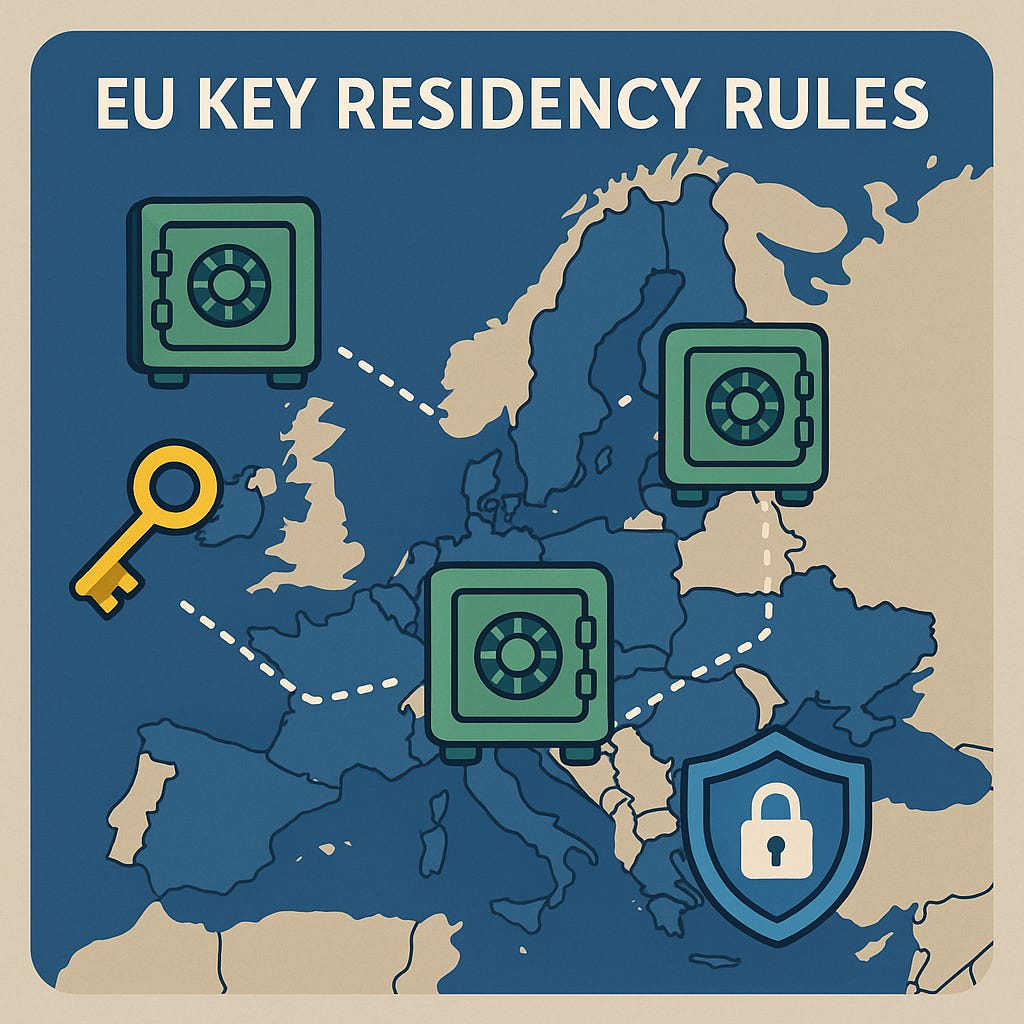TL;DR
What’s changing: The EU may require cloud providers to keep customer encryption keys on European soil to bolster data sovereignty.
Pros: Stronger legal safeguards, reduced risk of foreign orders (like the U.S. CLOUD Act) and greater customer trust.
Cons: Potential service fragmentation, higher costs and extra complexity for cross-border apps.
PrivID’s fix: Geo-fenced key vaults in your chosen region, crypto-agile support for any algorithm, zero-knowledge proofs of residency and integrated compliance reporting.
Brussels is preparing new regulations that would require cloud providers operating in the EU to store and manage customer encryption keys on European soil. The goal is to strengthen EU data sovereignty and ensure that only EU-based authorities can compel access to decryption keys. Proponents argue this will give businesses and citizens more control over their data incountry.com. Critics warn it risks fragmenting services, driving up costs and complicating cross-border cloud deployments.
The EU's Digital Services Act
The European Union's Digital Services Act (DSA) (2022) is a big step in updating the regulatory landscape governing digital services. This legislation modernises the existing e-commerce framework, addressing critical concerns around legal, and illegal, content, advertising transparency, and the proliferation of disinformation. The goal: to create a safer, more transparent, and accountable digital space for users. For businesses that have a presence online the DSA introduces requirements that must be met to remain compliant. PrivID, through its integration of technologies like Fully Homomorphic Encryption (FHE) and Zero-Knowledge Proofs (ZKP), is a strong solution for organisations looking to achieve compliance while ensuring security, privacy, and operational efficiency.
Why Key Residency Matters
Data sovereignty has become a core priority for EU policymakers. Recent initiatives—such as DNS4EU, the EU’s own privacy-focused DNS resolver—demonstrate a clear push to shift critical internet infrastructure under regional control . Encryption key residency is the logical next step. By ensuring that keys never leave EU jurisdictions, companies can sidestep extraterritorial laws like the U.S. CLOUD Act, which allows foreign authorities to demand data from service providers under U.S. jurisdiction lexisnexis.com.
How Your Domain Extension Could Put Your Data at Risk
When organisations think about cybersecurity and data sovereignty, they often focus on encryption, hosting locations, and compliance with laws such as GDPR and PIPEDA. However, an often-overlooked risk comes from something as simple as your domain extension
The Case for Local Key Management
Stronger Legal Safeguards
When keys are stored in the EU, any government request for data must abide by local judicial procedures.
Mitigated Extraterritorial Risk
Keeping keys out of reach of foreign legal orders reduces the chance of forced disclosure under non-EU laws.
Enhanced Trust
Customers and partners can verify that their data remains under EU oversight, fostering greater confidence in cloud services.
The Concerns
Service Fragmentation
For global providers, maintaining separate key-management infrastructures in each region adds complexity.Cost Increases
Building and certifying EU-only key vaults will likely raise subscription fees for end-users.Interoperability Hurdles
Cross-region applications may need additional logic to request and rotate keys in different jurisdictions.
How PrivID Supports True Data Autonomy
PrivID’s crypto-centric platform is built to meet the demands of key residency, data sovereignty and seamless global operations:
Elevate Your Data Security with PrivID: Advanced Protection for Cloud Storage
In today's digital landscape, safeguarding sensitive data is crucial. PrivID leverages the power of Zero-Knowledge Proofs (ZKPs) and Fully Homomorphic Encryption (FHE) to protect data [archives] within a cloud storage environment. By integrating these capabilities PrivID offers an unparalleled level of security and privacy, enabling organisations to store, share, and process valuable data with complete confidence.
Regional Key Vaults
PrivID offers geo-fenced key management. You can deploy independent vault clusters in the EU, UK or any approved region. Each cluster enforces local residency rules at the infrastructure level.Crypto-Agile Architecture
Our system is algorithm-agnostic. Whether you use classical AES keys or NIST-approved post-quantum schemes, PrivID lets you plug in new algorithms without rewriting your applications.Zero-Knowledge Key Access
With PrivID’s zero-knowledge proofs, you can demonstrate to auditors that keys are never exported or accessed outside approved regions—without revealing the keys themselves.Integrated DNS4EU Support
By combining PrivID with DNS4EU, organisations gain full control over their network name resolution and encryption keys within EU borders—creating a fully sovereign stack from DNS lookup to data decryption.Compliance Reporting
PrivID’s dashboard generates tamper-proof reports showing where each key is housed, which legal orders were processed and how keys were rotated, giving regulators and customers clear evidence of policy adherence.
The New Face of Europe: DNS4EU
TL;DR On 9 June 2025, the EU launched DNS4EU, its in-house DNS resolver that routes all queries within EU borders to ensure full GDPR compliance, inherent threat blocking and optional filtering for ads or family-safe browsing. Developed by a pan-EU consortium led by Czech firm Whalebone under ENISA’s coordination, it reduces dependency on US-based providers and strengthens resilience against geopolitical or supply-chain disruptions. Early adopters can switch with two simple configuration changes and immediately benefit from enhanced privacy, regulatory alignment and operational continuity. Next up: bespoke commercial deployments for ISPs and government bodies, complete with SLAs and advanced threat integrations—positioning DNS4EU as a strategic pillar of any EU-compliant infrastructure.
A Phased Adoption Roadmap
Impact Assessment
Map existing key inventories and cross-border dependencies.
Pilot Deployment
Stand up an EU-only key vault for a non-critical application or test environment.
Hybrid Roll-Out
Gradually migrate critical services to PrivID’s geo-fenced vaults, while maintaining global operations elsewhere.
Full Migration
Decommission legacy key stores and enforce EU residency rules across all new workloads.
Continuous Optimisation
Update cryptographic algorithms and expand regional vault nodes as regulations evolve.
Encryption key residency is more than a compliance checkbox. It is a practical way to reclaim control over your data and reduce reliance on foreign legal frameworks. With PrivID’s regional vaults, zero-knowledge audits and crypto-agile platform, you can adopt key residency rules without sacrificing performance or global reach.
Let us help you build a truly sovereign data infrastructure, start your PrivID pilot today.









